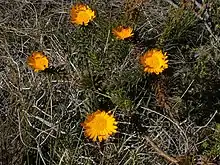| Oedera | |
|---|---|
 | |
| Oedera capensis | |
| Scientific classification | |
| Kingdom: | Plantae |
| Clade: | Tracheophytes |
| Clade: | Angiosperms |
| Clade: | Eudicots |
| Clade: | Asterids |
| Order: | Asterales |
| Family: | Asteraceae |
| Subfamily: | Asteroideae |
| Tribe: | Gnaphalieae |
| Genus: | Oedera L. 1771, conserved name, not Crantz 1768 (syn of Dracaena in Asparagaceae)[1] |
| Synonyms[2] | |
| |
Oedera is a genus of African flowering plants in the tribe Gnaphalieae within the family Asteraceae. The genus is named in honor of the Danish botanist Georg Christian Oeder.
The species have yellow central and ray florets in their flower-heads. Their seeds all have a little crown of scales, and the leaves are often fragrant and unpalatable for stock grazing.[3]
- Species
Species accepted by the Plants of the World Online as of December 2022:[2]
- Oedera acerosa (DC.) N.G.Bergh
- Oedera calycina (L.f.) N.G.Bergh
- Oedera capensis Druce
- Oedera conferta (Hutch.) Anderb. & K.Bremer
- Oedera corymbosa (Bolus) N.G.Bergh
- Oedera decussata (L'Hér.) N.G.Bergh
- Oedera dieterlenii (E.Phillips) N.G.Bergh
- Oedera epaleacea Beyers
- Oedera flavicoma (DC.) N.G.Bergh
- Oedera foveolata (K.Bremer) Anderb. & K.Bremer
- Oedera fruticosa (L.) N.G.Bergh
- Oedera garnotii (Less.) N.G.Bergh
- Oedera genistifolia (L.) Anderb. & K.Bremer
- Oedera glandulosa (Thunb.) N.G.Bergh
- Oedera hirta Thunb.
- Oedera humilis (Less.) N.G.Bergh
- Oedera imbricata Lam.
- Oedera intermedia DC.
- Oedera laevis DC.
- Oedera longipes (K.Bremer) N.G.Bergh
- Oedera montana (Bolus) N.G.Bergh
- Oedera muirii C.A.Sm.
- Oedera multipunctata (DC.) Anderb. & K.Bremer
- Oedera nordenstamii (K.Bremer) Anderb. & K.Bremer
- Oedera oppositifolia (DC.) N.G.Bergh
- Oedera pungens (L'Hér.) N.G.Bergh
- Oedera relhanioides (Schltr.) N.G.Bergh
- Oedera resinifera (K.Bremer) Anderb. & K.Bremer
- Oedera rotundifolia (Less.) N.G.Bergh
- Oedera sedifolia (DC.) Anderb. & K.Bremer
- Oedera silicicola (K.Bremer) Anderb. & K.Bremer
- Oedera spathulifolia (K.Bremer) N.G.Bergh
- Oedera speciosa (DC.) N.G.Bergh
- Oedera spinescens (DC.) N.G.Bergh
- Oedera squarrosa (L.) Anderb. & K.Bremer
- Oedera steyniae (L.Bolus) Anderb. & K.Bremer
- Oedera tricephala (DC.) N.G.Bergh
- Oedera uniflora (L.f.) Anderb. & K.Bremer
- Oedera virgata (N.E.Br.) N.G.Bergh
- Oedera viscosa (L'Hér.) Anderb. & K.Bremer
- formerly included
see Flaveria Heterolepis Hirpicium
- Oedera aliena L.f. - Heterolepis aliena (L.f.) Druce
- Oedera alienata Thunb. - Hirpicium alienatum (Thunb.) Druce
- Oedera trinervia Spreng. - Flaveria trinervia (Spreng.) C.Mohr
References
- ↑ Tropicos, search for Oedera
- 1 2 "Oedera L." Plants of the World Online. Royal Botanic Gardens, Kew. 2022. Retrieved 11 December 2022.
- ↑ "Oedera capensis factsheet". Lucid Central. Retrieved 2018-01-26.
This article is issued from Wikipedia. The text is licensed under Creative Commons - Attribution - Sharealike. Additional terms may apply for the media files.